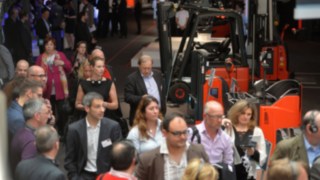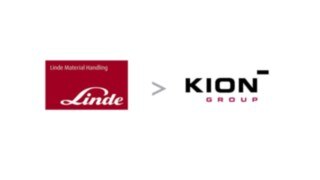
Full power for the drives of the future
9 May 2016
Linde Material Handling presents lithium-ion and fuel cell technology at WoMH
The availability of transport vehicles is crucial in logistics, and has a direct effect on the efficiency of processes. The energy system plays a key role in this, particularly where electric forklift trucks are concerned: charging, maintenance and battery changes all take time. But there are alternative systems that offer rapid charging or refuelling, and better energy efficiency. Linde Material Handling is presenting innovative developments in lithium-ion and fuel cell technology at the "World of Material Handling". These developments include the first Linde forklift trucks with lithium-ion batteries, warehouse technology trucks, and hydrogen-powered trucks as used by DB Schenker, Daimler and BMW, for example. Both technologies increase availability and thus productivity in intralogistics.
Processes in operational logistics are dictated by ever shorter time intervals. Periods of downtime – when a truck's battery has to be charged or replaced, for example – lead to costly delays. This is the downside of conventional lead acid battery technology, which has a particularly negative impact when used in multiple shift operation. "We want to provide our customers with the most efficient energy system for their specific applications," says Christophe Lautray, Chief Sales Officer at Linde Material Handling. "In order to do this we are furthering the development of those technologies which, in our experience, offer the greatest advantages."
More energy, quicker charging, enhanced safety
One such technology is the lithium-ion battery. It can be fully charged very quickly – in one to two hours in Linde's warehouse technology trucks, for example – and allows for interim charging without compromising service life. The batteries also deliver around 95% of the charged energy with no loss of performance when the charge level drops. This eliminates the need for replacement batteries and battery changes in multiple shift operation, saving time, space and money. Furthermore, the lithium-ion battery does not give off any harmful gases during charging and is maintenance-free. Trucks can therefore be charged anywhere on the company’s site; this means they do not have to drive to a separate charging area (such areas are, in fact, no longer needed) and employees do not have to handle acids. "The trucks are thus particularly suitable for food manufacturing and other sensitive industries," explains Tobias Zierhut, Head of Product & Service Marketing at Linde.
Product news: pallet stackers and counterbalanced forklift trucks
Linde already supplies pallet trucks, order pickers and tow tractors with lithium-ion batteries. Now, at WoMH, the company is showcasing a pallet stacker and counterbalanced forklift trucks for load capacities of 1.4 to 1.8 tonnes, equipped with the innovative new technology. In addition to its existing 24 V battery, Linde has developed another battery size with 48 V nominal voltage for higher tonnages. Depending on usage, the operator can choose between two battery sizes and two different chargers with 9 or 18 kW power output.
Considered system integration
"During the development process we really focused on the careful system integration of truck, battery system and charger in order to ensure a high level of efficiency and safety," says Tobias Zierhut. Batteries and chargers are specially developed for use in forklift trucks: the batteries in particular are protected thanks to their cell and module structure and the construction of the battery compartment. "The battery also communicates with the truck and charging system and notifies them, among other things, of its precise charge status in hours and minutes and also of potential malfunctions," adds Zierhut. Shock sensors enable the battery to be put into safety mode in the event of very strong vibrations.
Linde will continue to expand its range of electric forklift trucks with lithium-ion batteries, and is also working on developing the charging technology even further: in future, it will even be possible to charge trucks with lithium-ion batteries inductively. This means that the truck will simply need to be positioned over a charging plate – a process which will be demonstrated at WoMH. Visitors will not just get to see the lithium-ion trucks – they also get to test drive them at a special testing facility.
The fuel cells – clean and efficient
In addition to lithium-ion batteries, however, Linde is also focusing its efforts on developing the fuel cell as an alternative energy system: hydrogen-powered Linde forklifts and warehouse technology trucks have proved themselves in various types of long-term use by customers such as DB Schenker, BMW and Daimler. At WoMH Linde is presenting, among other things, a T 20 SP pallet truck which has been used in a DB Schenker handling warehouse in Linz for three years in multiple shift operation. "The fuel cell really comes into its own when a truck is in constant use, because the system is at full capacity again within minutes," says Tobias Zierhut, Head of Product & Service Marketing. "Hydrogen technology can already be implemented in a cost-effective way under certain conditions and is also – if the hydrogen is manufactured using renewable resources – a real alternative to conventional technology from the point of view of sustainability.” At the event, visitors can get information and advice about the developments they can best use to help reduce costs further and about how companies can develop sustainable hydrogen generation and the necessary infrastructure for refuelling.
The future of intralogistics: WoMH demonstrates a wealth of ideas and solutions
Under the title ‘Linked Perspectives’, the World of Material Handling event will provide answers to the biggest questions which intralogistics will face in the future: not just energy systems, but also networking, individualisation and automation. "Internal logistics will increasingly be networked, digitalised and automated," says Linde's Chief Sales Officer Lautray. Spanning over a space measuring 12,000 square metres, the event will feature exhibition areas, 3D-media shows, expert forums, product demonstrations and experience zones. The exhibits can be demonstrated as part of guided group tours or visitors can discover them on their own. “Following on from the comprehensive exhibition two years ago, we are concentrating this year on the four most significant areas of expertise which will be of vital importance for our customers in the very near future,” explains Manfred Höhn, Head of Marketing Communication and Branding.

